Coincidentally, the Collie dog breed has captured the hearts of dog lovers all over the world with its striking appearance and exceptional qualities. With their loyal and protective nature, Collies have proven to be more than just a pretty face.
But what exactly makes them stand out from other breeds? What are their unique characteristics and temperament? In this discussion, we will uncover the fascinating world of Collies, exploring their origins, physical traits, intelligence, and their ability to adapt to various living environments.
Prepare to be amazed as we unravel the mysteries of this remarkable breed and discover what makes Collies truly exceptional.
Key Takeaways
- Collies are intelligent and easy to train, making them a great choice for families.
- They are loyal and hardworking dogs, known for their protectiveness and good nature with children.
- Collies require regular exercise to keep them happy and healthy, as well as socialization to prevent shyness or aggression.
- It is important to consider factors beyond just their size when determining if a Collie is suitable for apartment living, such as energy levels and behavior.
Origin and Size
The Collie dog breed originated in Scotland and Northern England and is known for its medium size, ranging from 22 to 26 inches tall and weighing between 45 to 75 pounds. These dogs have a well-proportioned body and a graceful appearance. Their size makes them versatile, allowing them to excel in various activities such as herding, agility, obedience, and even as therapy dogs.
The Collie's medium size also makes them suitable for families and individuals with different living situations. Whether living in a house with a yard or in an apartment, the Collie can adapt well to its surroundings. However, it's important to note that regardless of their size, Collies have high energy levels and require regular exercise to stay healthy and happy.
Breed Group and Lifespan
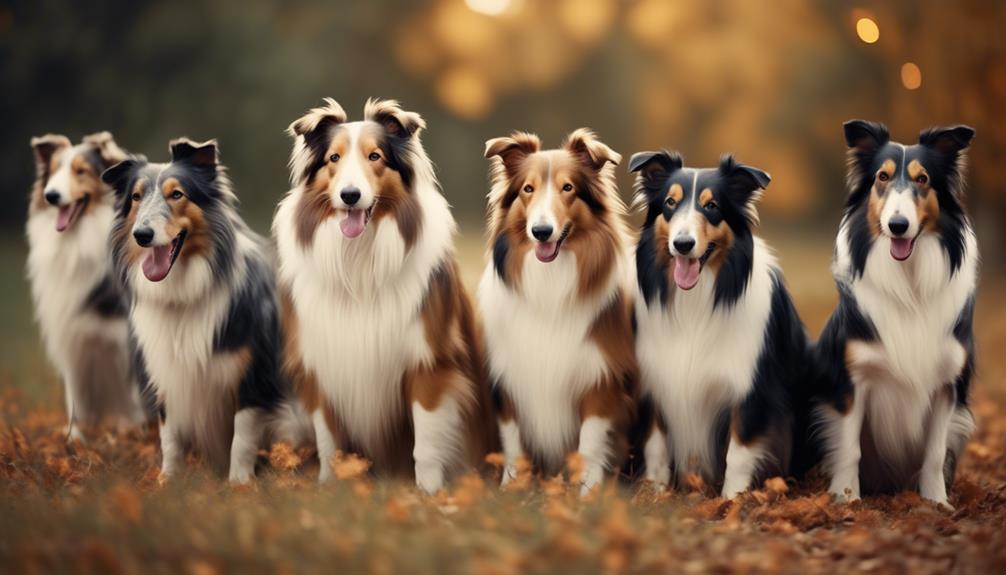
Originating in Scotland and Northern England, the Collie dog breed belongs to the herding group and has a lifespan ranging from 10 to 14 years. As herding dogs, Collies have a natural instinct to gather and control livestock. They're known for their intelligence, loyalty, and hardworking nature.
Collies form strong bonds with their families and are protective and gentle with children. In terms of lifespan, Collies typically live for a decade or slightly longer. However, it's important to note that individual dogs may live shorter or longer lives depending on various factors such as genetics, diet, exercise, and overall health care.
Collie owners should prioritize regular vet check-ups, a nutritious diet, and providing adequate exercise to ensure their beloved pets live a long and healthy life.
Appearance and Coat Varieties
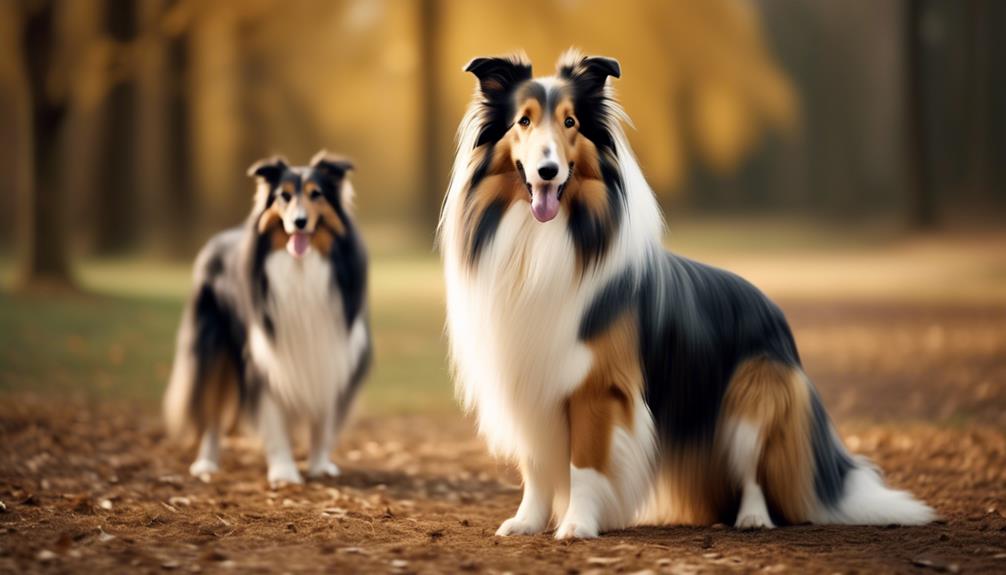
With their striking appearance and two distinct coat varieties, Collies are known for their distinctive and beautiful looks. The rough-coated Collie has a long, dense, and straight outer coat, while the smooth-coated Collie has a shorter and coarser coat. Both varieties have a soft and dense undercoat, providing insulation and protection from the elements. Collies come in various colors, including sable, tricolor, blue merle, and white. The table below provides a quick overview of the different coat varieties and their characteristics:
| Coat Variety | Description |
|---|---|
| Rough | Long, dense, and straight outer coat with a soft and dense undercoat. Requires regular grooming to prevent matting and keep the coat looking its best. |
| Smooth | Shorter and coarser coat with a soft and dense undercoat. Easier to maintain compared to the rough coat, requiring less grooming. |
The Collie's coat not only adds to its aesthetic appeal but also serves a practical purpose in protecting the dog from various weather conditions. Whether it's the regal elegance of the rough coat or the sleek and streamlined look of the smooth coat, Collies are sure to turn heads wherever they go.
Intelligence and Trainability
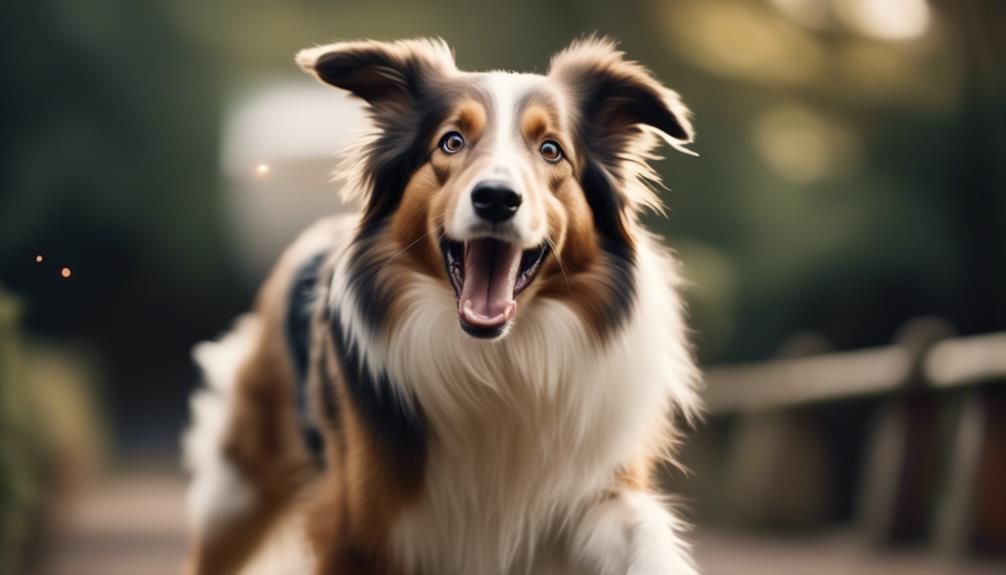
Known for their exceptional intelligence and trainability, Collies are a breed that excels in learning and performing a wide range of tasks.
Their high level of intelligence allows them to quickly grasp new concepts and commands, making them highly trainable. Collies are known to be eager to please their owners, which further enhances their trainability.
They've a strong work ethic and enjoy having a job to do, which makes them excellent candidates for various activities such as obedience, agility, herding, and search and rescue. Their intelligence also enables them to problem-solve and think independently, making them adaptable to different situations.
However, it's important to provide them with mental stimulation and regular training to prevent boredom and potential behavioral issues. With the right guidance and positive reinforcement, Collies can reach their full potential in training and excel in any tasks they're given.
Loyalty and Family Bonds
After showcasing their exceptional intelligence and trainability, it's evident that Collies also demonstrate unwavering loyalty and form strong family bonds.
Collies are known for their deep devotion and dedication to their families, making them excellent companions and guardians. They thrive when they're included as part of the family unit and enjoy participating in various activities with their loved ones.
Collies are highly protective of their family members, especially children, and will go to great lengths to ensure their safety and well-being. This loyalty extends not only to their immediate family but also to other pets in the household, as Collies are typically gentle and friendly towards other animals.
Whether it's snuggling up on the couch, going for walks, or engaging in playtime, Collies cherish the time spent with their loved ones and form lasting bonds that withstand the test of time.
Exercise and Energy Levels
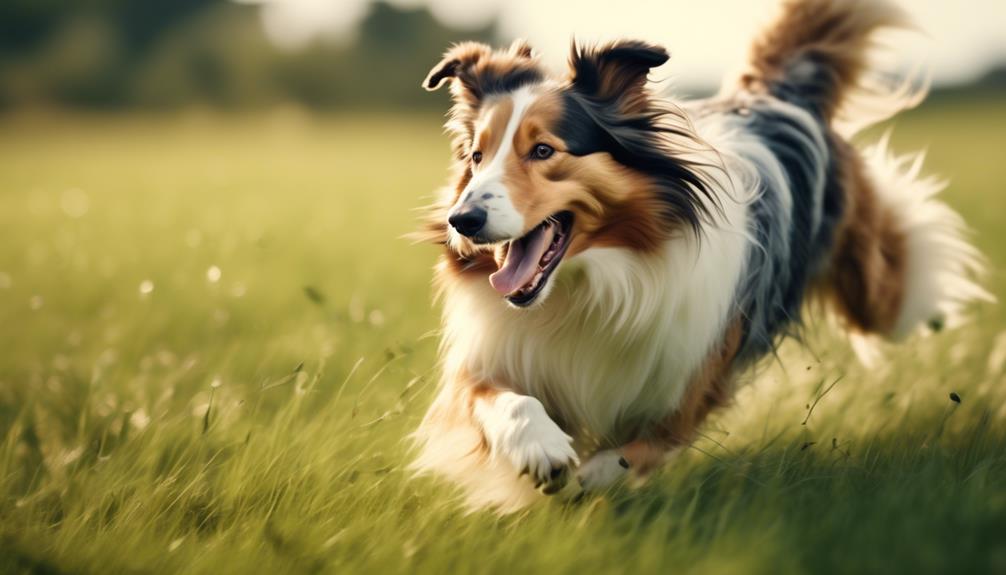
Collies are a breed known for their high exercise needs and energetic nature. To keep them happy and healthy, it's important to provide them with regular physical activity. Here are three key points about Collie exercise and energy levels:
- Daily Exercise: Collies require daily exercise to burn off their energy. This can include activities such as brisk walks, runs, or playing fetch. Engaging in mentally stimulating activities, such as agility training or puzzle toys, can also help keep their minds sharp.
- High Energy Levels: Collies are an energetic breed that thrives on physical activity. They've a natural herding instinct that drives them to be active and on the move. Without enough exercise, they may become restless, bored, or even destructive.
- Mental Stimulation: In addition to physical exercise, Collies also benefit from mental stimulation. They're intelligent dogs that enjoy tasks that challenge their problem-solving abilities. Engaging them in activities such as obedience training or interactive games can help satisfy their mental needs.
Temperament and Socialization
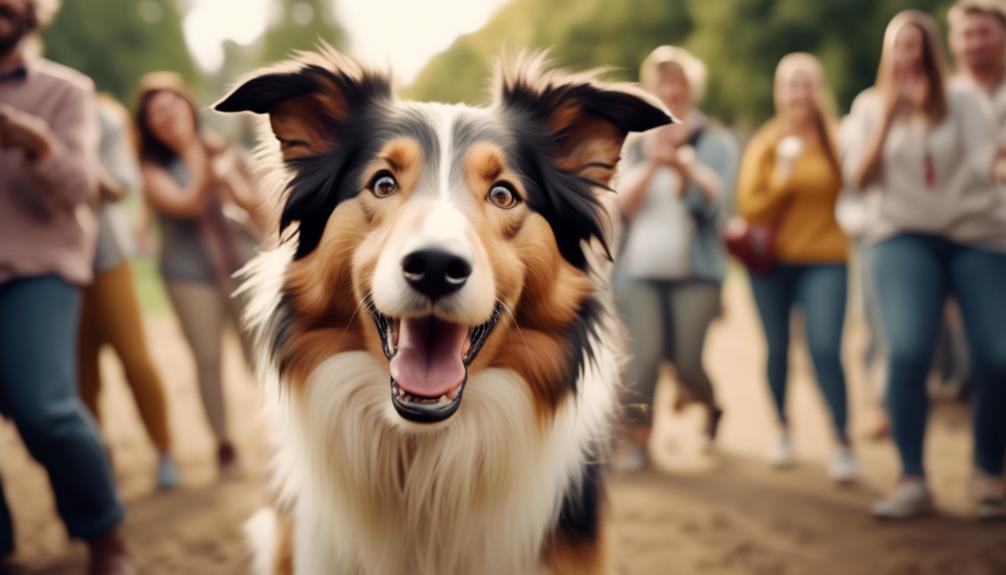
To understand the temperament of Collies and the importance of socialization, it's crucial to consider their intelligence, sensitivity, and innate herding instincts.
Collies are highly intelligent dogs, known for their ability to learn quickly and problem-solving skills. They're also very sensitive, picking up on subtle cues and emotions from their owners and environment. These traits make them responsive and adaptable to training, but they also require gentle handling and positive reinforcement to avoid becoming shy or anxious.
Additionally, Collies have strong herding instincts, which can manifest in their behavior towards other animals or even children. Proper socialization from a young age is essential to ensure that these instincts are channeled appropriately and that Collies become well-rounded and confident companions.
Health Concerns and Regular Check-ups

Regular check-ups and proper healthcare are essential for maintaining the overall well-being of Collies and addressing any potential health concerns they may have. Here are three important considerations regarding the health of Collies:
- Genetic Health Issues: Collies are prone to certain genetic health issues, such as hip dysplasia, elbow dysplasia, and Collie eye anomaly. Regular check-ups and health screenings can help detect these conditions early on, allowing for timely intervention and management.
- Diet and Exercise: A proper diet and regular exercise are crucial for the good health of Collies. Maintaining a balanced and nutritious diet, along with providing them with daily exercise, can help prevent obesity, promote healthy growth, and support their overall well-being.
- Responsible Breeding: It's important to choose a reputable breeder who practices responsible breeding. Responsible breeders prioritize the health of their dogs and work to minimize the risk of genetic health issues through selective breeding. Opting for a puppy from a responsible breeder can greatly reduce the likelihood of encountering serious health problems in the future.
Adaptability to Apartment Living

After addressing the importance of regular check-ups and responsible breeding for the health of Collies, it is crucial to consider their adaptability to apartment living. Collies can indeed adapt well to living in apartments, but size alone should not be the sole determinant. Other factors such as energy levels and space requirements must also be taken into account. Ideally, quiet, low-energy, and well-mannered dogs are preferable for apartment living to ensure the comfort of neighbors. Indoor playtime and brisk walks can meet their exercise needs. To provide a more detailed understanding of the breed's adaptability to apartment living, the following table illustrates the factors to consider:
| Factors to Consider | Description |
|---|---|
| Size | Not the only factor to consider |
| Energy levels | Low-energy dogs are preferable |
| Space requirements | Consider the available living space |
| Noise levels | Quiet dogs are more suitable |
| Exercise needs | Indoor playtime and walks can meet them |
| Neighbors' comfort | Ensure a harmonious living environment |
| Personal experience | Evaluate own dog-owning experience |
Factors to Consider for Apartment Suitability

When considering the suitability of Collies for apartment living, it's important to take into account various factors such as their size, energy levels, and space requirements.
- Size: Collies are medium-sized dogs, ranging from 22 to 26 inches tall and weighing between 45 to 75 pounds. While they aren't giant breeds, their size should still be considered when thinking about apartment living.
- Energy Levels: Collies are known for being active and hardworking dogs. They've moderate energy levels and require daily exercise to keep them mentally and physically stimulated. It's important to provide them with enough exercise and mental stimulation, even in an apartment setting.
- Space Requirements: Collies need enough space to move around comfortably. Although they can adapt well to apartment living, it's important to provide them with adequate indoor playtime and regular brisk walks to meet their exercise needs.
Behavior and Aggression Management
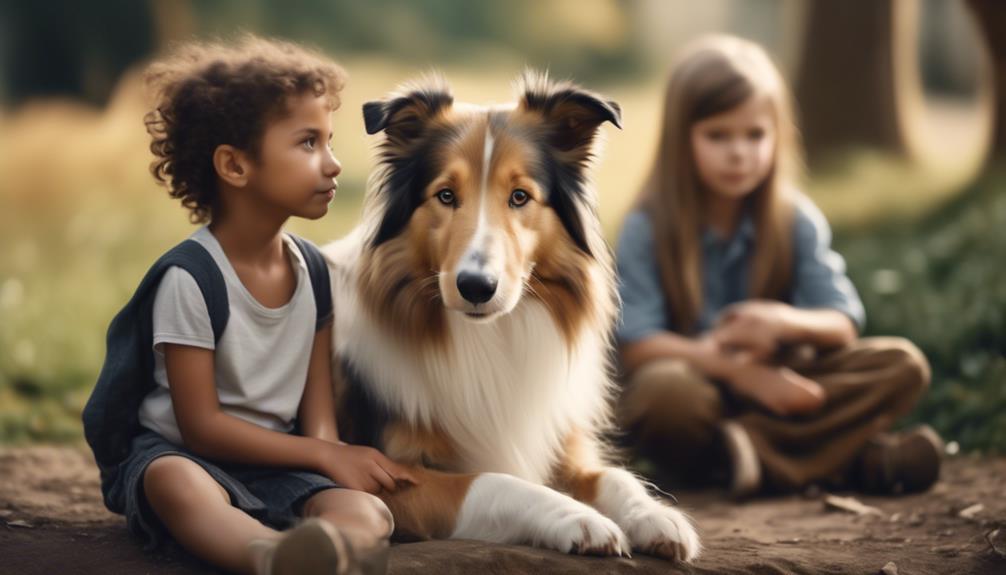
To effectively manage behavior and aggression in Collies, it's crucial to understand the underlying causes and implement appropriate training and socialization techniques.
Collies are intelligent and sensitive dogs, and aggression can often be rooted in fear and anxiety. It's important to identify any triggers or stressors that may be causing the aggression and work on desensitization and counterconditioning.
Consistent and positive reinforcement-based training methods should be used to teach the Collie appropriate behaviors and reinforce good manners.
Early socialization is also key in helping the Collie develop positive and confident interactions with other dogs and people.
Providing regular exercise and mental stimulation is essential for preventing behavioral issues and promoting overall well-being.
History, Feeding, Coat, and Care
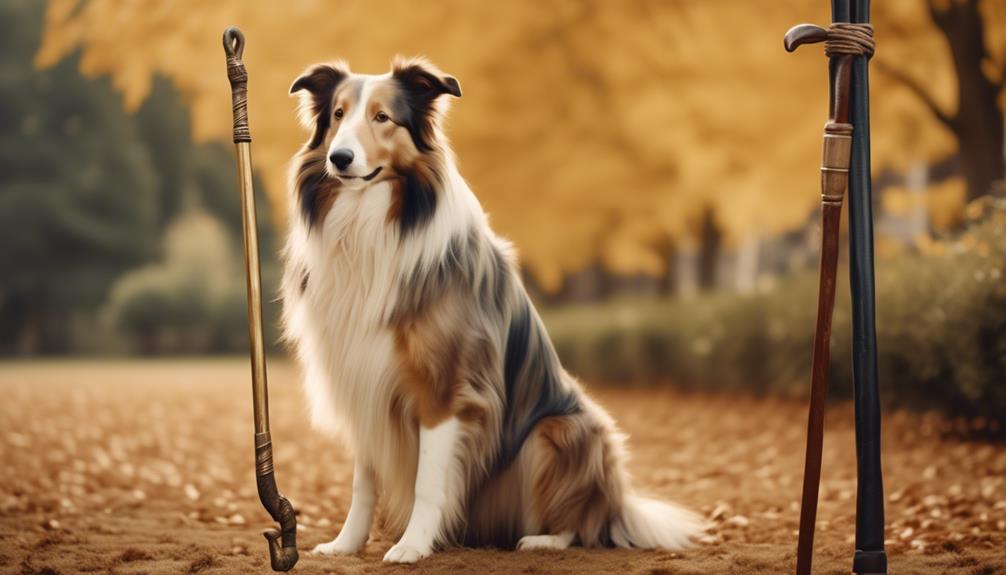
The history of Collies provides valuable insights into the origins of the breed. They are native to Scotland and were brought to the British Isles by Roman conquerors. Queen Victoria played a significant role in saving the breed from obscurity.
Feeding is an important aspect of caring for Collies. The recommended daily amount of food depends on factors such as size, age, build, metabolism, and activity level. The quality of dog food also plays a role in determining the amount needed to keep them healthy.
Collies have two coat types – rough and smooth – and come in four colors – sable, tricolor, blue merle, and white. Grooming needs vary based on the coat variety, with rough coats requiring more maintenance than smooth coats.
Properly understanding the history, feeding, coat, and care of Collies is essential for providing them with the care they need and ensuring their well-being.
Frequently Asked Questions
Are Collies Good With Other Animals Besides Children?
Yes, collies are generally good with other animals besides children. They are known to be gentle and protective, making them suitable companions for other pets. Proper socialization and training are key to fostering positive relationships.
How Often Should a Collie Be Groomed?
How often should a collie be groomed? Regular grooming is important for a collie's long, thick coat. They should be brushed at least once a week to prevent matting and remove loose hair.
Do Collies Have a Strong Prey Drive?
Yes, collies have a strong prey drive. They were bred to be herding dogs, which means they have an instinctual desire to chase and control livestock. It's important to properly train and socialize them to manage this behavior.
Can Collies Be Left Alone for Long Periods of Time?
Yes, collies can be left alone for long periods of time, but it is not ideal for their well-being. Collies are highly social dogs that thrive on human companionship and may become anxious or develop behavioral issues if left alone for extended periods.
Are Collies Prone to Separation Anxiety?
Collies can be prone to separation anxiety due to their loyal and sensitive nature. It's important for owners to gradually acclimate them to being alone, provide mental stimulation, and consider professional help if needed.
What are the similarities and differences between Collies and Dachshunds in terms of breed characteristics?
Collies and Dachshunds vary in size and appearance, but both are known for their loyalty and intelligence. Collies are larger and have a long, flowing coat, while Dachshunds are smaller with a distinctive elongated body. Both breeds are friendly and make excellent family pets, but they require different levels of exercise and grooming due to their dachshund dog breed characteristics.
Conclusion
In conclusion, the Collie dog breed is a remarkable and versatile breed that possesses numerous positive traits.
With their intelligence, loyalty, and gentle nature, Collies make excellent family pets and are particularly well-suited for households with children.
Additionally, their adaptability to different living situations, including apartments, makes them a popular choice for many dog lovers.
An interesting statistic to note is that Collies have a lifespan of 10 to 14 years, providing many years of joy and companionship for their owners.




